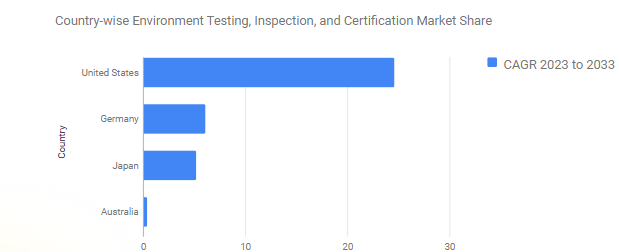Imagine a world where air is fresh, water is clean, and land is nurtured for future generations. This vision is supported by the Environmental Testing, Inspection, and Certification (ETIC) Market, a vital sector that ensures environmental compliance and promotes sustainability. ETIC companies offer a range of services to assess environmental impact, identify potential hazards, and verify adherence to regulations. By safeguarding the environment, this market protects human health, ecosystems, and the planet’s natural resources. Driven by growing environmental concerns, stricter regulations, and a rising focus on corporate social responsibility, the ETIC Market is experiencing significant growth. Let’s delve into the diverse applications of ETIC services and explore the exciting trends shaping this dynamic market.
Protecting Our Planet: Applications of ETIC Services
ETIC services play a crucial role in various environmental sectors:
- Pollution Control and Monitoring: ETIC companies conduct air, water, and soil testing to assess pollution levels and ensure compliance with environmental regulations. They also perform inspections of industrial facilities to identify potential sources of pollution and recommend mitigation strategies.
- Waste Management: ETIC services ensure proper waste handling and disposal practices. This includes testing hazardous waste to classify it correctly, inspecting waste management facilities, and certifying companies that adhere to responsible waste management protocols.
- Environmental Impact Assessments (EIAs): ETIC companies conduct EIAs to evaluate the potential environmental impact of development projects. This helps ensure projects are planned and executed with minimal environmental harm.
- Sustainability Consulting: ETIC firms provide expert guidance to businesses seeking to adopt sustainable practices. This can include developing environmental management systems, conducting life cycle assessments of products, and identifying opportunities to reduce environmental footprints.
- Climate Change Mitigation and Adaptation: ETIC services support efforts to combat climate change. This includes monitoring greenhouse gas emissions, verifying carbon offset projects, and assisting companies in developing climate adaptation strategies.
Get Exclusive Sample Copy of the Report: https://www.futuremarketinsights.com/reports/sample/rep-gb-5602
Cultivating a Greener Future: A Market Poised for Growth
The ETIC Market is experiencing a surge in popularity driven by several key trends:
- Growing Environmental Concerns: Public awareness of environmental issues like climate change, pollution, and biodiversity loss is driving the demand for ETIC services to ensure environmental protection.
- Stricter Environmental Regulations: Governments around the world are implementing stricter environmental regulations, mandating pollution control measures, and requiring companies to demonstrate environmental responsibility. This necessitates the use of ETIC services for compliance purposes.
- Focus on Corporate Social Responsibility (CSR): Many businesses are prioritizing sustainability initiatives and environmental responsibility as part of their CSR efforts. ETIC services help companies demonstrate their commitment to a sustainable future.
- Technological Advancements: Advancements in analytical methods, remote sensing technology, and data management are making ETIC services more efficient, accurate, and cost-effective.
- Growing Demand for Sustainable Products and Services: Consumers are increasingly seeking products and services from companies with a proven track record of environmental responsibility. ETIC certifications can help businesses cater to this growing demand.
According to forecasts, the environment testing, inspection, and certification market is expected to be USD 19,035.60 million in 2023 and USD 33,551.7 million by 2033.

Challenges to Consider: Nurturing Sustainable Practices
Despite the promising outlook, the ETIC Market faces some hurdles:
- Skilled Workforce Shortage: The growing demand for ETIC services necessitates a qualified workforce of environmental scientists, inspectors, and auditors. Investing in training programs is crucial to address this potential gap.
- Standardization of Regulations: Environmental regulations can vary across different countries and regions. This can create challenges for multinational companies seeking to comply with diverse standards.
- Accessibility and Cost: ETIC services can be expensive, particularly for small and medium-sized businesses. Developing more affordable and accessible solutions can broaden market reach.
Get Full Report Now: https://www.futuremarketinsights.com/checkout/5602

